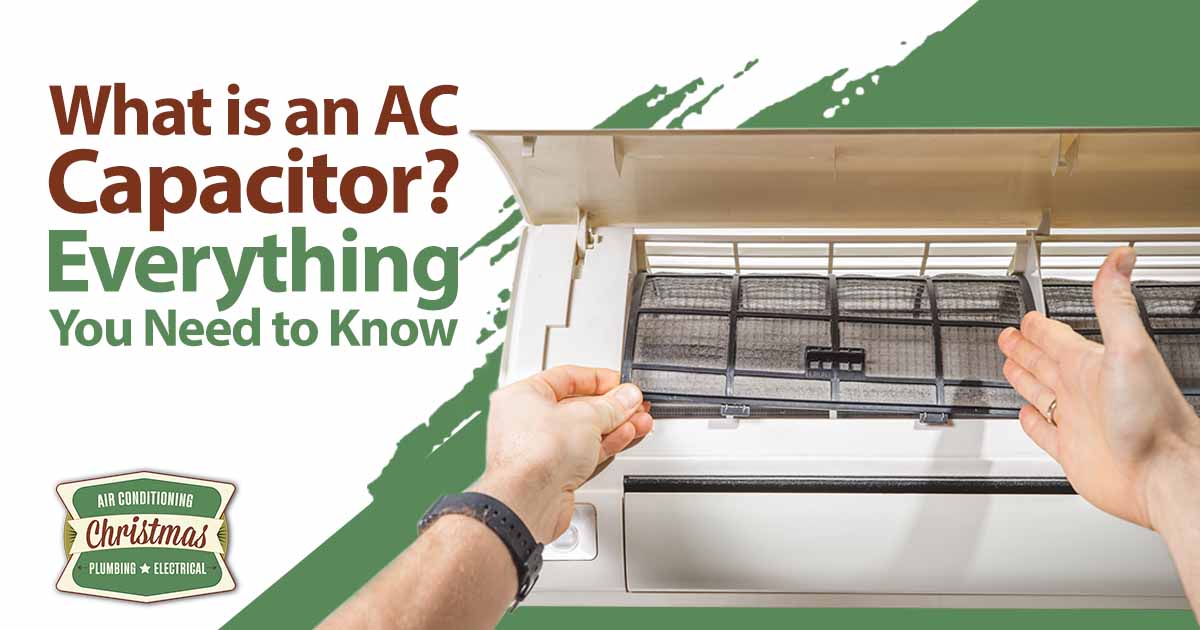Imagine the AC refusing to start in the middle of a hot summer day – a real nightmare. One issue that can prevent the AC from running smoothly is a problem with the capacitor. While the capacitor is a small part, the role that it plays in the AC is huge.
So, what is a capacitor in an AC unit and how do you know it needs replacement?
What is an AC Capacitor?
The shiny, cylindrical object connected to a whole bunch of wires inside your AC unit is the capacitor. It consists of an insulator sandwiched between two electrodes made from metal plates. One of these plates stores an electrical charge and the other discharges it when needed.
Capacitors come in a wide variety of sizes. Their storage potential or capacitance can vary from 5 MFD (microfarads) to 80 MFD. The higher the value, the more charge it holds.
Now, an AC unit can have multiple capacitors. The starting capacitor provides the initial jolt of electricity needed to start the motor. Then, the running capacitor takes over to ensure smooth running.
What Does an AC Capacitor Do?
The electricity supplied through your home’s wiring is insufficient to start the AC unit. This is where the capacitor delivers the energy surge that starts the AC motor or a heat pump.
Think of a water tank that holds water and can supply it during demand. The capacitor performs the same function with an electrical charge.
But hang on. That sounds like a battery.
True, but there is a major difference. The capacitor can dump its entire stored energy within a fraction of a second whereas a battery takes longer to get discharged.
Signs of a Bad AC Capacitor
Note that a capacitor may require replacement even if AC maintenance is regularly done. Firstly, they have a limited life span and can wear out with age. Besides, excess heat or voltage overloads can shorten their lifespan.
Here are some common signs that indicate a capacitor problem in your AC.
- Cold air not blowing out from the AC vents
- The unit takes longer than usual to start and keeps shutting off randomly.
- The AC not turning on
- Higher energy bills than usual
- Humming or clicking noises when you start the AC
Can I Replace a Capacitor for AC Units Myself?
In theory, you can replace a malfunctioning capacitor on your own. But a sound knowledge of working with electrical circuits is needed to do it right. So, don’t risk disassembling your air conditioner by relying on DIY AC capacitor repair tutorials.
Be warned: since capacitors store charge, you need to discharge it completely before handling. Or else, there is a risk of receiving a nasty shock. If you are not familiar with the task, it is best to take the help of a licensed professional who can safely handle high-voltage components.
Final Thoughts
Replacing an AC capacitor is a task best left to professionals. Only a certified technician can accurately diagnose and resolve the root issue affecting your AC unit.
At Christmas Air Conditioning & Heating, we specialize in diagnosing and repairing all types of capacitor issues for air conditioning systems. Our skilled technicians are committed to restoring your comfort with fast, reliable service.
Call us today at 469-919-9928 to schedule your service or request an estimate.

